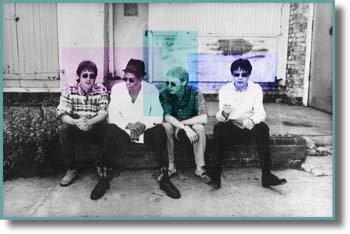
Rankin
Shoal and Tell: Ocean Colour Scene is quickly becoming the favorite Brit-pop band, behind only Oasis.
Ocean Colour Scene, the newest pop sensation in England, goes platinum with 'Moseley Shoals'
By Alan Sculley
SINGER SIMON FOWLER of Ocean Colour Scene can point to a specific moment that will emphatically illustrate how life has changed for his group over the past 12 months. On Dec. 18, the band played the famed Royal Albert Hall in London, filming the show for use in a soon-to-be-produced long-form video.
"It's funny because that exact date last year, we played to 120 people in Perth, Scotland, in a club called Twatams," Fowler says. "Then we're playing the Albert Hall. Then we're playing New Year's Eve. We're playing in Edinburgh, and there's going to be 350,000 people there. We'll be headlining. So that's as big as Knebworth, plus Wembley Stadium."
In fact, in its homeland of England, Ocean Colour Scene is considered by many to be the country's most popular band behind Oasis. The group's second CD, Moseley Shoals (MCA), has gone platinum, and has scored three Top-15 singles, "The Riverboat Song," "You've Got It Bad" and "The Day We Caught the Train."
It's quite a leap for a group that 18 months ago had a hard time even getting a gig in its home base of Birmingham.
"It's totally beyond us all," Fowler says. "It's--wow--what the heck happened there? Yeah, all this in America, I don't know how much this means to them. It probably doesn't mean a great deal. But in England, it's been a phenomenal year.
"The year before, we were absolutely nothing," he adds. "So it has been amazing." The newfound popularity stands as a stunning vindication for the band--Fowler, guitarist Steve Cradock, bassist Damon Minchella and drummer Oscar Harrison--which had seen its career come crashing to a halt three years ago after the release of its self-titled debut CD.
Signed to the independent label Phffft Records (which was aligned with the major label Fontana/ Mercury), the group had twice recorded versions of the record that had been rejected by Phffft, before cutting a third version that satisfied all parties.
Given such disruptions, it's no surprise that the record made little headway on the charts. Soon afterward, Ocean Colour Scene found itself without a record deal and back woodshedding in its own studio.
"It came from necessity really because we knew that we've got the studio. So that was an obvious thing for us to do," Fowler says of the band's decision to focus on writing and rehearsing.
"So every day," he adds, "basically for three years, we went to the studio and recorded. I think it's important when you're a band not to feel like your whole existence is only validated by having a record deal.
"I started writing songs for the band when I was 13, and I didn't get a record deal until I was 21. But we at least did that. We couldn't really go out and do a lot of gigs because no one really wanted to see us. It was difficult to get gigs at that point."
As those comments indicate, Fowler doesn't reveal any bitterness over the events surrounding the first record--even though the problems would have been enough to sour most any band.
Instead, Fowler tends to answer questions about the period quickly and seems genuinely eager to move on to discussing current events.
"It's a very long and tedious story," Fowler comments at one point, perhaps best summing up his outlook on the group's troubles. "The only sort of thing that I remember with particular fondness from that time really was working with Jimmy Miller [one of three producers used on the debut], which was a ball, too much fun, in fact."
Policemen & Pirates
ALTHOUGH Fowler claims the band initially was happy with its debut CD, as time went on, it grew to see weaknesses in the debut, and those feelings had a direct influence on the group's approach to Moseley Shoals.
"It didn't really sound like Ocean Colour Scene," Fowler says. "It sounded like it could have almost been anyone playing. It didn't sound like us. But really, if you listen to some of the early demos of that album, they sound very similar to the stuff we do now. That was always the thing we were trying to do."
Indeed, Moseley Shoals does have a sound that sets Ocean Colour Scene apart from the group's peers. While many of today's most popular British bands show a distinct Beatles-like pop sound, Ocean Colour Scene's sound draws strongly from a wider range of sources.
For instance, the song "40 Past Midnight," with its pounding piano lines and funky beat, relies heavily on the Motown and Stax soul sound. By contrast, "Policemen & Pirates" spins the soul feel into a ballad context.
The group further separates itself from British pop with a couple of other tracks.
"The Riverboat Song," with its hard-edged guitar and rolling beat, has a bit of psychedelia to it. "Fleeting Mind" shows the group's folk influences with its dreamy acoustic textures.
And when Ocean Colour Scene does focus on a poppier sound (as on "The Circle" or the "Day We Caught the Train"), the band shows an appealing knack for matching smooth melodies with punchy tempos.
"I don't think people do call us a pop band," Fowler says. "There are a few pop things on there, a few things you would say would be post-Beatlesy, sort of the structures and the harmonies. But 'Riverboat' isn't a pop song, is it? No. 'You've Got It Bad,' I wouldn't say [is pop]. 'Fleeting Mind' isn't. ... I think the influences are pretty diverse, from the Beatles, the Stones, the Who, the Kinks, and Tamla, Motown and Stax. My particular thing is Neil Young, Joni Mitchell, Fairport Convention, a lot of folk."
[ Metro | Metroactive Central | Archives ]
![[Metroactive Music]](/music/gifs/music468.gif)